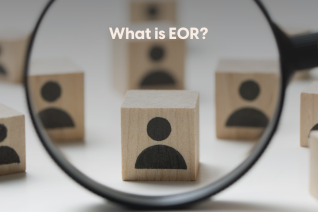Run your business seamlessly with Neeyamo as we help you go beyond borders to manage your international payroll and hire new talent in Fiji.
Overview
Fiji is an archipelago of over 300 islands in the South Pacific Ocean. The two largest islands are Viti Levu and Vanua Levu, which together account for about 87% of the country's land area. The islands are mostly volcanic in origin and are surrounded by coral reefs.
Fiji's economy is primarily based on tourism and agriculture. Sugar is the country's main export, followed by gold, fish, and timber. Tourism is a growing sector, and Fiji is a popular destination for scuba diving, surfing, and other water sports.
Do your organization's expansion plans require hiring employees in Fiji? Do you lack a physical entity in the country – a key requisite to hire local talent? Neeyamo – one of the top Global payroll providers, assists organizations worldwide with onboarding and managing employees in Fiji - processing payroll, managing local compliance requirements, benefits, and more.
Tools And Instances
Facts And Stats
Capital
Suva
Currency
Fijian Dollar (FJD)
Official Language
Fijian
Fiscal Year
1 August - 31 July
Date Format
DD/MM/YYYY
International Code
+679
Other Languages
Fijian, iTaukei , English, Fiji Hindi
Time Zone
UTC + 12
Global Payroll
Overview
Handling payroll for a widespread workforce can pose a significant challenge for any organization, and the added complication of compliance can make things worse and drastically effect the time and efforts that can be used in other equally important aspects of an organization's development. If companies spend more time processing payroll, it directly impacts day-to-day operations and their overall productivity.
Over the years, Neeyamo has observed these complexities and strived to provide a global payroll solution through a single technology platform - Neeyamo Payroll. Cloud based payroll service providers, like Neeyamo, assess payroll industry trends and offer a consolidated solution in its Global Payroll Technology Stack making outsourcing payroll cost per employee easier.
Payroll Taxes
Payroll tax is the percentage amount retained from an employee's salary and paid to the government to invest in the general population's welfare. These are statutory in nature and are levied from both the employer and employee. Additional statutory contributions are made by employers towards aiding both short-term and long-term benefits for their employees. Neeyamo aids you in completing all your payroll and tax accounting needs.
Employee Taxes
Employee Invidual Income Tax:
| Income Range (FJD) | Tax Rate |
| 0 to 30,000 | 0% |
| 30,001 to 50,000 | 18% of excess over FJD 30,000 |
| 50,001 to 270,000 | FJD 3,600 plus 20% of excess over FJD 50,000 |
| 270,001 to 300,000 | FJD 47,600 plus 20% of excess over FJD 270,000 |
| 300,001 to 350,000 | FJD 53,600 plus 20% of excess over FJD 36)00,000 |
| 350,001 to 400,000 | FJD 63,600 plus 20% of excess over FJD350,000 |
| 400,001 to 450,000 | FJD 73,600 plus 20% of excess over FJD400,000 |
| 450,001 to 500,000 | FJD 83,600 plus 20% of excess over FJD 450,000 |
| 500,001 to 1,000,000 | FJD 93,600 plus 20% of excess over FJD 500,000 |
| 1,000,001 and over | FJD 193,600 plus 20% of excess over FJD 1,000,000 |
Employer Taxes
Social Security Contributions to the Fiji National Provident Fund
- Employer - 7%
- Employee - 7%
Payroll Cycle
Overview
Undoubtedly, payroll is a critical process for any organization. The pay cycle in Fiji refers to the period for which an organization pays its employees, and this can vary depending on the pay frequency that the organization chooses to adopt.
Frequency
The frequency cycle is Monthly.
13th Month Cycle
There is no law that requires employers in Fiji to provide employees with a 13th/14th/15th month bonus pay.
Global Work
Overview
An Employer of Record services (EOR) provider helps you eliminate the hassle of handling complexities while onboarding a new employee in an international location. They help bridge the gap that otherwise mandates organizations to have a local registered entity and a local bank account, prior to making a job offer to an international hire.
An Employer of Record services provider acts as a legal employer, facilitates salary payments, and manages other statutory requirements such as health insurance, payroll taxes, and employee benefits ensuring compliance with local tax laws and regulations.
This allows organizations to focus on collaborating with the employee in Fiji for operational tasks, with the knowledge that they have a cost-effective solution support their global HR and payroll requirements, as they continue their global expansion.
HR Mandates and Practices
Minimum Wage
Overtime
The normal working hours for private sector employees in Fiji are 8 hours/day or 44 hours/week. but they must not exceed 48 hours/week.
The rate of overtime pay is as follows:
1.5 times the employee's normal hourly rate for the first four hours worked in excess of normal working hours and Twice the employee's normal hourly rate for all time worked thereafter.
Overtime work on Scheduled Days Off and National Holidays:
- Twice the worker’s normal rate of remuneration in respect of all the time worked on a rostered day-off;
- One and half times the worker’s normal hourly rate of remuneration in respect of all time worked on a public holiday;
For all time worked on Saturdays, Sundays, and public holidays:
1)The rate of remuneration payable for overtime shall be at least 1.5 times the regular hourly rate
Data Retention Policy
Fiji's labor laws do not explicitly stipulate that employers must guarantee the protection and privacy of employee data in the workplace. Nevertheless, it is advisable for employers in Fiji to adhere to international best practices when handling sensitive personal information, such as during background checks or workplace monitoring and surveillance.
Hiring and Onboarding Requirements
Hiring
The Employment Relations Act of 2007, as amended in 2020, prohibits discrimination in employment on the following grounds:
- Sex
- Race
- Religion
- Political opinion
- Personal characteristic and circumstances
- Colour
- Place of origin
- Gender
- Sexual orientation
- Identity
- Expression
- Birth
- Primary language
- Economic or social health status
- HIVB/AIDS status
- Disability age
- Marital status or pregnancy
Employers are required to pay employees a minimum wage. The minimum wage is set by the government.
Employees are entitled to annual paid leave, sick leave, and other types of leave.
Onboarding
The following documents are typically required for onboarding a new employee in Fiji:
- Copy of passport or birth certificate:
- Copy of qualifications
- Police check certificate
- Immigration status document
In addition to the above, the employer may also require the following documents:
- Bank account details
- Tax file number (TFN)
- Superannuation fund details
Probation
There is no legal provision for a probation period for employees. However, this can be determined within the employment contract between the employer and the employee.
Leave
Public Holidays
- 1 January - New Year's Day
- 2 January - New Year Holiday
- 7 April - Good Friday
- 8 April - Easter Saturday
- 10 April - Easter Monday
- 7 September - Constitution Day
- 2 October - Prophet Muhammad's Birthday
- 10 October - Fiji Day
- 12 November - Diwali Holiday
- 25 December - Christmas Day
- 26 December - Boxing Day
Annual leave
Employees are entitled to 10 working days of paid annual leave after each year of employment. Leave must be taken in an unbroken period, unless otherwise agreed between the employee and employer.
Sick leave
Employees are entitled to 10 working days of paid sick leave per year. Sick leave may be taken for a full day or a half day. An employee absent from work for more than three consecutive days must provide a doctor's certificate to their employer specifying the nature of the illness or injury.
Family care leave
Employees who have worked for an employer for at least three months are entitled to five working days of paid family care leave per year. Family care leave may be taken to care for or support a member of the employee's immediate family or a member of the employee's household. (this leave does not include in carry over)
Bereavement leave
Employees who have worked for an employer for at least three months are entitled to paid bereavement leave for 3 days
Maternity leave
Female employees are entitled to 84 days of paid maternity leave, 42 days before the expected date of delivery and 42 days after the birth of the child. A daily maternity allowance of F$5.00 is also payable during the leave period.
Paternity leave
Male employees are entitled to five working days of paid paternity leave after the birth of their child. If:
- The employee has completed more than 3 months of continuous service with the same employer;
- The employee is or is to be a primary caregiver for his child; and
- The employee provides a medical certificate specifying the expected date of the birth of his child.
Maternity leave
A female employee with at least 150 days of employment in the nine months before the expected delivery is eligible for 98 days of paid maternity leave upon providing a medical certificate specifying the due date.
If absent for more than 98 consecutive days, the employee is not entitled to wages beyond this period.
If a female employee passes away before or after childbirth without receiving entitled wages, the employer or any of her employers is responsible for paying these wages to the nominee.
Termination
Overview
The termination of employment of private sector employees in Fiji is governed by the Employment Relations Act 2007 (ERA). The ERA sets out the minimum requirements for employers to follow when terminating an employee's employment.
Notice Period
Notice periods are as follows:
- Where the contract period is less than one week and wages are paid at intervals of less than one week, there is no notice period
- Where the contract period is one week or more but less than a fortnight or where wages are paid weekly or at intervals of more than a week but less than a fortnight, notice period of 7 days seven days
- Where the contract period is a fortnight or more but less than a month or where wages are paid fortnightly or at intervals of more than a fortnight but less than a month, the notice period is of 14 days
- Where the contract period is one month, the notice period is of one month
Severance Pay
In Fiji the amount of the redundancy payment is 1 week's salary per year worked.
Visa
Employment Visa
- Completed and signed application of work permit form
- Certified copy of applicant’s bio-data page of passport
- Two [2] certified photographs
- Request letter from the employer
- Police Report for Principal applicant [from country of citizenship]
- Curriculum Vitae [CV]
Employee Background Checks
Legal and Background Checks
In Fiji, there are no explicit legal regulations governing background checks for employment.
The most common types of background checks conducted in Fiji include:
- Academic certificates
- Work experience
- Criminal records
- financial history
- Medical records
- Identity searches: This includes verifying the applicant's address, driver's license, and social media presence.
Last updated on November 28, 2023
If you have any queries or suggestions, reach out to us at irene.jones@neeyamo.com
¿Tiene consultas? Póngase en contacto con nosotros
Póngase en contacto con uno de nuestros expertos y obtenga una demostración rápida de nuestros servicios






